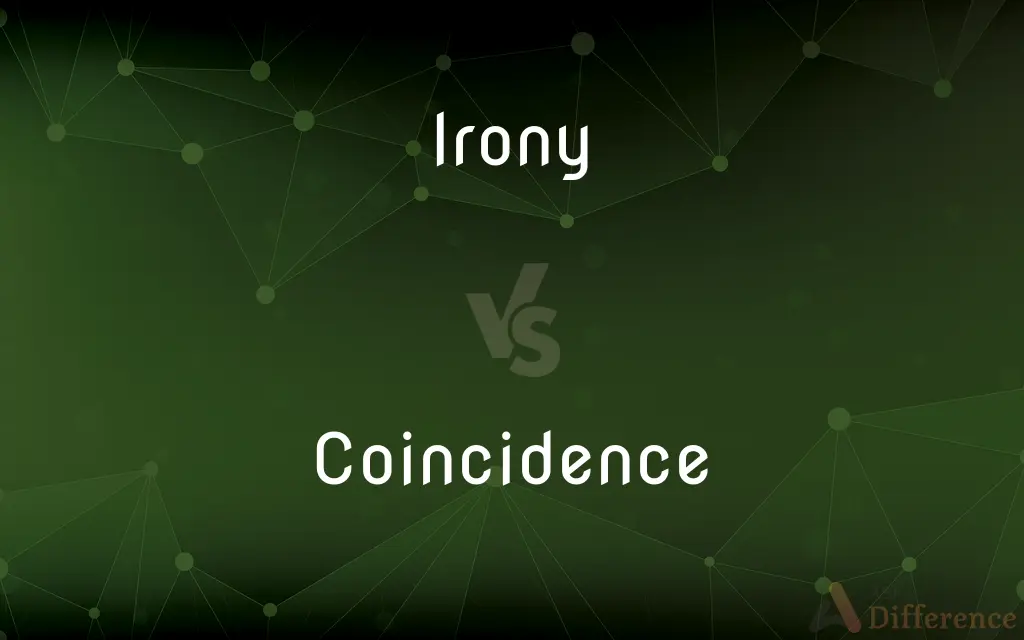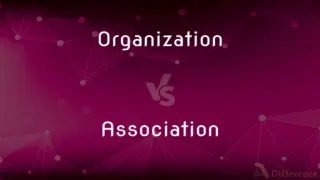Irony vs. Coincidence — What's the Difference?
By Tayyaba Rehman — Updated on October 5, 2023
Irony involves an incongruity between expectations and reality, while coincidence is the unexpected occurrence of two similar or identical events simultaneously or sequentially with no apparent connection.

Difference Between Irony and Coincidence
Table of Contents
ADVERTISEMENT
Key Differences
Irony and coincidence both involve situations in which events unfold in unexpected ways, however, their inherent natures and implications diverge considerably. Irony traditionally implicates a disparity or incongruity between expectation and outcome, essentially producing a result that's opposite or starkly dissimilar to what was anticipated. Coincidence, alternatively, doesn't propose such a deliberate or conspicuous incongruity but instead indicates the random or unanticipated occurrence of two or more events at one time or sequentially.
In irony, there's often a perceptible contrast or contradiction between what is said and what is meant, or what happens and what was expected to happen. This deviation from expectation, embedded in irony, involves an element of surprise, sometimes accompanied by humor or criticism. On the contrary, coincidence lacks this intrinsic contrast and contradiction, presenting situations where unrelated events appear to be meaningfully connected, even though they’re not.
The incongruity which is intrinsic to irony often conveys a subtle or explicit message, possibly criticizing or emphasizing an opposite or unexpected outcome. This deviation, illustrative of irony, regularly incorporates a level of discernment, perhaps illuminating discrepancies in understanding or expectation. Whereas, coincidence does not deliberately communicate such messages or critiques and does not inherently embody an insightful or contradictory dimension.
In literature and speech, irony serves as a rhetorical device that conveys a discrepancy between appearance and reality or expectation and result, often with an underlying message or critical tone. Coincidence, however, doesn’t serve as a rhetorical device and doesn’t convey any underlying message or tone, as it implies random events appearing connected without any causal relationship.
Irony and coincidence, while both implicating unexpectedness, diverge in their intents and implications. Irony intentionally highlights disparities, sometimes utilizing them to underline philosophical or thematic points, while coincidence simply pertains to the accidental occurrence of simultaneous events, devoid of intentional implication or inherent critique.
ADVERTISEMENT
Comparison Chart
Definition
Incongruity between expectation and outcome
Simultaneous occurrence of similar events without apparent connection
Intent
Often intentional
Unintentional
Underlying Message
Typically present
Absent
Use in Literature
As a rhetorical device
Not a rhetorical device
Expectation vs. Reality
Includes a deliberate gap
No deliberate gap
Compare with Definitions
Irony
Critical Tone
The irony in his review subtly mocked the film’s clichés.
Coincidence
Unplanned Event
It was a coincidence that they met at the airport.
Irony
Contradictory Meaning
His irony was unnoticed when he complimented her messy room.
Coincidence
Random Occurrence
By coincidence, they wore the same outfit.
Irony
Unexpected Outcome
The irony was that the fire station burned down.
Coincidence
Simultaneous Happenings
Their emails arrived in a surprising coincidence.
Irony
Irony (from Ancient Greek εἰρωνεία eirōneía 'dissimulation, feigned ignorance'), in its broadest sense, is a rhetorical device, literary technique, or event in which what on the surface appears to be the case or to be expected differs radically from what is actually the case. Irony can be categorized into different types, including verbal irony, dramatic irony, and situational irony.
Coincidence
Serendipity
Their meeting at the café was a happy coincidence.
Irony
The use of words to express something different from and often opposite to their literal meaning.
Coincidence
Accidental Similarity
The resemblance between the paintings was a pure coincidence.
Irony
An expression or utterance marked by a deliberate contrast between apparent and intended meaning
"the embodiment of the waspish don, from his Oxbridge tweeds to the bone-dry ironies of his speech and prose" (Ron Rosenbaum).
Coincidence
A coincidence is a remarkable concurrence of events or circumstances that have no apparent causal connection with one another. The perception of remarkable coincidences may lead to supernatural, occult, or paranormal claims.
Irony
Incongruity between what might be expected and what actually occurs
"Hyde noted the irony of Ireland's copying the nation she most hated" (Richard Kain).
Coincidence
A remarkable concurrence of events or circumstances without apparent causal connection
They met by coincidence
It was a coincidence that she was wearing a jersey like Laura's
Irony
An occurrence, result, or circumstance notable for such incongruity
The ironies of fate. See Usage Note at ironic.
Coincidence
The fact of corresponding in nature or in time of occurrence
The coincidence of interest between the mining companies and certain politicians
Irony
Dramatic irony.
Coincidence
The presence of ionizing particles or other objects in two or more detectors simultaneously, or of two or more signals simultaneously in a circuit.
Irony
Socratic irony.
Coincidence
The state or fact of occupying the same relative position or area in space.
Irony
(rhetoric) The quality of a statement that, when taken in context, may actually mean something different from, or the opposite of, what is written literally; the use of words expressing something other than their literal intention, often in a humorous context.
Coincidence
A sequence of events that although accidental seems to have been planned or arranged.
Irony
(countable) An ironic statement.
Coincidence
Of objects, the property of being coincident; occurring at the same time or place.
Irony
Dramatic irony: a theatrical effect in which the meaning of a situation, or some incongruity in the plot, is understood by the audience, but not by the characters in the play.
Coincidence
Of events, the appearance of a meaningful connection when there is none.
That the two writers were born and died on the same day is just a coincidence, although there are many conspiracy theories about it.
Irony
Socratic irony: ignorance feigned for the purpose of confounding or provoking an antagonist.
Coincidence
(analysis) A coincidence point.
Irony
(informal){{cite-journal
Coincidence
(geometry) A fixed point of a correspondence; a point of a variety corresponding to itself under a correspondence.
Irony
Of or pertaining to the metal iron.
The food had an irony taste to it.
Coincidence
The condition of occupying the same place in space; as, the coincidence of circles, surfaces, etc.
Irony
Made or consisting of iron; partaking of iron; iron; as, irony chains; irony particles; - In this sense iron is the more common term.
Coincidence
The condition or fact of happening at the same time; as, the coincidence of the deaths of John Adams and Thomas Jefferson.
Irony
Resembling iron in taste, hardness, or other physical property.
Coincidence
Exact correspondence in nature, character, result, circumstances, etc.; concurrence; agreement.
The very concurrence and coincidence of so many evidences . . . carries a great weight.
Those who discourse . . . of the nature of truth . . . affirm a perfect coincidence between truth and goodness.
Irony
Dissimulation; ignorance feigned for the purpose of confounding or provoking an antagonist.
Coincidence
An event that might have been arranged although it was really accidental
Irony
A sort of humor, ridicule, or light sarcasm, which adopts a mode of speech the meaning of which is contrary to the literal sense of the words.
Coincidence
The quality of occupying the same position or area in space;
He waited for the coincidence of the target and the cross hairs
Irony
Witty language used to convey insults or scorn;
He used sarcasm to upset his opponent
Irony is wasted on the stupid
Satire is a sort of glass, wherein beholders do generally discover everybody's face but their own
Coincidence
The temporal property of two things happening at the same time;
The interval determining the coincidence gate is adjustable
Irony
Incongruity between what might be expected and what actually occurs;
The irony of Ireland's copying the nation she most hated
Irony
A trope that involves incongruity between what is expected and what occurs
Irony
Rhetorical Device
The irony in the novel highlighted the protagonist’s naive beliefs.
Irony
Literary Technique
Irony was used to convey the grim reality behind the seemingly happy ending.
Common Curiosities
Does irony always convey an underlying message?
Yes, irony often conveys a subtle or explicit message.
Can irony be unintentional?
Irony is typically intentional, especially in literature or rhetoric.
Can irony occur by chance?
While real-life irony can appear coincidental, it’s often crafted in narrative forms.
Is coincidence a rhetorical device?
No, coincidence is not considered a rhetorical device.
Can irony be found in everyday situations?
Yes, irony can be observed in various everyday contexts.
Can coincidences have a cause-and-effect relationship?
Coincidences typically lack a causal relationship between events.
Is irony always obvious?
No, irony can sometimes be subtle and easy to overlook.
Do coincidences occur frequently?
Coincidences can occur frequently or infrequently, depending on perspective.
Can coincidence imply irony?
While a coincidence can be ironic, they aren’t inherently related.
Can irony be humorous?
Yes, irony can often be used to create humor.
Are coincidences intentional?
No, coincidences are generally considered unintentional.
Does coincidence carry a hidden meaning or critique?
Coincidence does not inherently carry a hidden meaning or critique.
Can irony be sad or tragic?
Yes, irony can emphasize tragic or sad outcomes.
Can irony be positive?
Yes, irony can highlight positive discrepancies in certain contexts.
Is coincidence always surprising?
Coincidence often involves unexpectedness, making it surprising.
Share Your Discovery

Previous Comparison
Organization vs. Association
Next Comparison
Breccia vs. ConglomerateAuthor Spotlight
Written by
Tayyaba RehmanTayyaba Rehman is a distinguished writer, currently serving as a primary contributor to askdifference.com. As a researcher in semantics and etymology, Tayyaba's passion for the complexity of languages and their distinctions has found a perfect home on the platform. Tayyaba delves into the intricacies of language, distinguishing between commonly confused words and phrases, thereby providing clarity for readers worldwide.














































